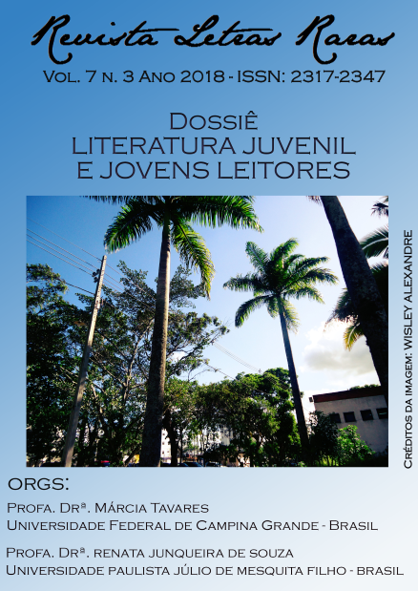Estudos interculturais e suas múltiplas perspectivas: um estudo bibliográfico
Palavras-chave:
Língua, Cultura, InterculturalidadeResumo
DOI: https://dx.doi.org/10.35572/rlr.v7i3.1047
Este é um estudo bibliográfico que objetiva apresentar conceitos de cultura, língua e sala de aula intercultural. Apesar de alguns estudos apontarem visões diferentes sobre língua e cultura e, principalmente, sobre as fronteiras que as unem e as separam, nossa postura foi apenas de fazer um levantamento com base em alguns autores da teoria cultural. Para amparar a nossa investigação, apoiamo-nos em autores como Corbett (2003), Risager (2005, 2006, 2010), Spencer-Oatey e Franklin (2009), Hall (2012), dentre outros. São tratados, neste estudo, alguns conceitos de cultura, língua e fluxos linguísticos e fluxos culturais, como também algumas teorias sobre separabilidade e inseparabilidade entre língua e cultura, competência intercultural e a sala de aula intercultural. Ao final da exposição teórica, vislumbramos a importância de o professor assumir uma postura intercultural, possibilitando uma experiência mais ampla de aprendizagem ao seu alunado, pautado no respeito às diferenças. Assumir, portanto, uma abordagem intercultural de ensino de línguas envolve a capacidade de observar, interpretar e ter uma consciência cultural mais crítica.
Downloads
Referências
AGAR, M. Language Shock: Understanding the Culture of Conversation. New York: William Morrow, 1994.
BYGATE, M. Applied linguistics: a pragmatic discipline, a generic discipline? Applied Linguistics, v. 26, n. 4, p. 568-581, 2005.
BYRAM, M. Teaching and Assessing Intercultural Communicative Competence. Clevedon: Multingual Matters, 1997.
______.; FLEMING, M. Language Learning in Intercultural Perspective: Approaches Through Drama and Ethnography. Cambridge: Cambridge University Press, 1998.
CORBETT, J. An Intercultural Approach to English Language Teaching. Clevedon: Multilingual Matters Ltd, 2003.
FERREIRA, A. B. de H. Dicionário Aurélio Eletrônico da Língua Portuguesa. Disponível em: . Acesso em: 29 nov. 2018.
FRIEDRICH, P. Language, ideology, and political economy. American Anthropologist 91, p. 295-312.
GEERTZ, C. The Interpretation of Cultures. London: Hutchinson, 1973.
HALL, J. K. Teaching and researching language and culture. Harlow: Pearson Education, 2012.
HALLIDAY, M. A. K. Explorations in the Functions of Language. London: Edward Arnold, 1973.
HANNERZ, U. Cultural Complexity: Studies in the Social Organization of Meaning. New York: Columbia University Press, 1992.
HARRISON, B. Culture and the Language Classroom. London: Macmillan and Modern English Publications/British Council, 1990.
HYMES, D. ‘Formal Discussion’. The Acquisition of Language: Monographs of the Society for Research in Child Development, v. 29, p. 107-111.
KRAMSCH, C. Language and Culture. Oxford: OUP, 1998.
______. Culture in Foreign Language Teaching. Iranian Journal of Language Teaching Research, v. 1, n. 1, p. 57-78, January 2013.
LARAIA, R. B. Cultura um Conceito Antropológico. Rio de Janeiro: Jorge Zahar Ed, 2001. Disponível em: . Acesso em: 15 abr. 2016.
LE PAGE, R; TABOURET-KELLER, A. Acts of Identity: Creole-based Approaches to Language and Ethnicity. Cambridge: Cambridge University Press, 1985.
REES, D. K.; BETANE FERREIRA, H. Conflitos macroculturais e a sala de aula de língua inglesa. Revista Horizontes de Linguística Aplicada, v. 14, n. 2, p. 15-38, 2015.
RISAGER, K. Language teaching and the process of European integration. In: BYRAM, M.; FLEMING, M. (Ed.). Language Learning in Intercultural Perspective. Cambridge: Cambridge University Press, 1998, p. 242-254.
______. Languaculture as a key concept in language and culture teaching. In: PREISLER, B.; FABRICIUS, A.; HABERLAND, H.; KJAERBECK, S.; RISAGER, K. (Eds.). The consequences of mobility. Roskilde: Roskilde University, 2005. p. 185-196.
______. Language and culture: global flows and local complexity. Clevedon: Multilingual Matters Ltd, 2006.
______. The language teacher facing transnationality. SYMPOSIUM 1. Udine, September 7-8, p. 2-13, 2010. European Universities Network on Multilingualism.
SANTOS, J. L. dos. O que é Cultura. 14. ed. São Paulo: Brasiliense, 1996 (Coleção Primeiros Passos; 110).
SPENCER-OATEY, H.; FRANKLIN, P. Intercultural Interaction: A Multidisciplinary Approach to Intercultural Communication. New York: Palgrave MacMillan, 2009.
STREET, B. ‘Culture is a verb: Anthropological aspects of language and cultural process’. In: GRADDOL, D.; THOMPSON, L.; BYRAM, M. (Ed.). Language and Culture. Clevedon: Multilingual Matters, 1993. p. 23-43.
TYLOR, E. B. The Science of Culture. In: ______. Primitive Culture: Researches into the Development of Mythology Philosophy, Religion, Language, Art and Custom. v. I. Mineola, New York: Dover Publications, Inc., 2016. p. 1-22.
WILLIAMS, R. Culture is ordinary. In: GRAY, A.; MCGUIGAN, J. (Ed.). Studying Culture. London: Edward Arnold, 1958. p. 5-14.
Downloads
Publicado
Como Citar
Edição
Seção
Licença
Copyright (c) 2023 Revista Letras Raras

Este trabalho está licenciado sob uma licença Creative Commons Attribution-NonCommercial 4.0 International License.







